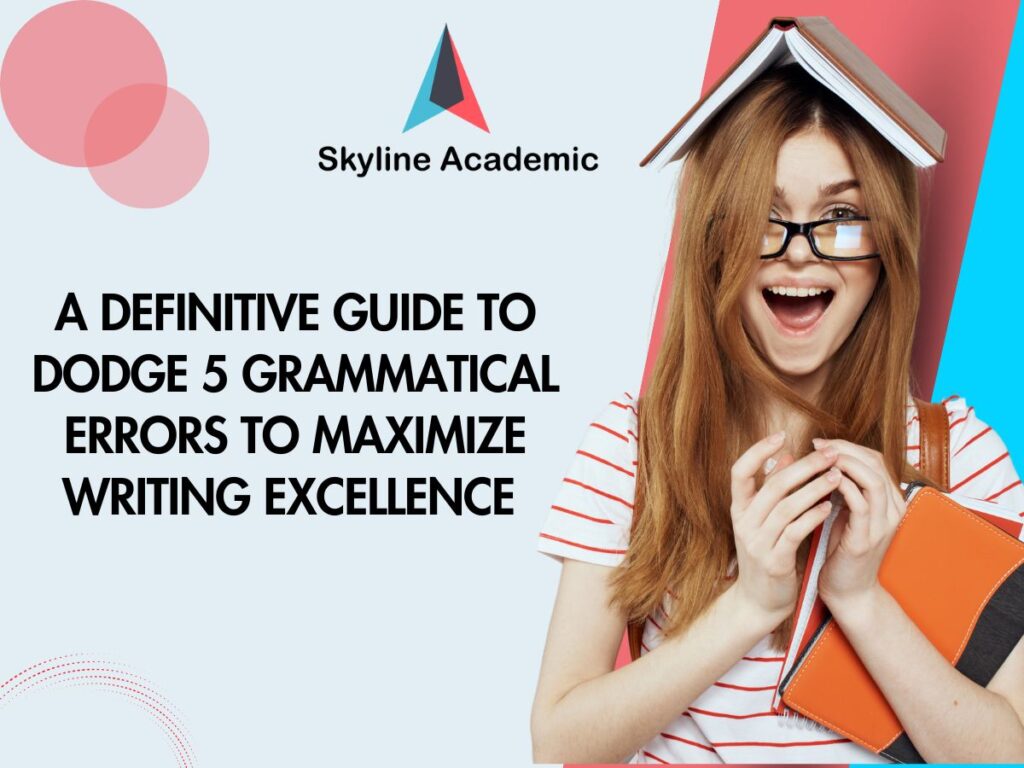Even after graduating from respected educational institutes, there are some aspects that people still lose grip over. It could be geometry diagrams, physics laws, or making terrible grammatical errors.
Sometimes sentences can sound perfect in your mind, but when you write them down, they can look strange due to grammatical errors. That’s where the reality check starts. But how to realize these common mistakes even after not knowing that you are making them? Well, at skyline academic we can help you in avoiding 5 common grammatical errors.
Ready to explore where you stand when it’s time to check your grammatical skills? Here we go!
Major Grammatical Errors
1. Your vs. You’re:
The word “your” indicates ownership, showing that something belongs to you or the person you are addressing.
For example:
“Your house is beautiful.” Here, “your” refers to the “thing you are speaking about (the house)”. It can be explained as you are reflecting ownership of something.
And, you’re is actually the combination of two words “you” and “are”, which unitedly make you’re.
For example:
“You’re very innocent.” Here, “you’re” is actually about being something. Like being innocent. Makes sense. Right?
What if we clarify it by combining both sentences? Let’s give it a try.
Your (ownership) house is beautiful and you’re (being something) very innocent. That’s how you can differentiate both.
2. Misplacing Apostrophes:
Putting apostrophes in the wrong places is a common mistake. But understanding how it works is going to be easy for you from now on.
You use apostrophes when you show that “something belongs to someone.”
For example:
“The boy’s marker.
When something “belongs to one person”, you use an apostrophe before “s”.
Pro Tip:
Never use apostrophes with possessive pronouns.
(Wrong) Whose’s book is this?
(Right) Whose book is this?
Also, when something belongs to more than one person, you use an apostrophe after “s”.
For example:
“The boys’ marker.”
There is one more thing to recall, “contracted words” where one or two letters are omitted to shorten the word. These contracted words also contain apostrophes.
For example:
- Would not … Wouldn’t
- She is … She’s
- I will … I’ll
These are usually not appreciated in academic writing as contracted words are informal.
Bonus Point:
Also, apostrophes “don’t support plural words”.
3. Incomplete Comparison:
“My doll is prettier.”
Can you understand what’s wrong with this sentence?
Prettier than whose doll?
There must be some other thing to compare, right?
For example:
“Prettier than my sister’s doll.”
“Prettier than all the dolls I’ve ever had.”
If you are saying: My doll is pretty. The sentence is correct as it does not involve any comparison.
Look, try not to make easy sentences complex by incomplete comparisons. Always clarify the other thing that you’re comparing your mentioned thing with.
Pro Tip:
Want to make sure your writing shines? Skyline Academic’s experts will polish your work by eliminating grammatical errors, spelling mistakes, and unnecessary punctuation mistakes.
4. Mixing Up Homonyms:
Homonyms are quite tricky. They are those words that “sound the same but are spelled differently and have different meanings”. Always be careful while using them. Some most common mistakes include:
There vs.Their
There is an “adverb” that indicates “place”.
For example:
- Go there.
- They are working there.
Their is a “determiner” that “indicates belongings”.
For example:
- It’s their plate.
- They are having fun in their apartment.
To Vs.Too Vs.Two
To is a “Preposition” that refers to “some directions”.
For example:
- I am going to school.
- He ran to the apartment.
Two is a “number”.
For example:
- I have two bananas.
- This girl has two books.
Too is an adverb that means in addition.
For example:
- Don’t eat too many sweets.
- He is innocent and funny too.
Then Vs.Than
Then refers to “what is going to happen after something”.
For example:
- First, take a shower and then eat your meal.
Than is used when you “compare two things or persons”.
For example:
- You are taller than your brother.
Weather Vs.Whether
Weather is a “noun” that describes “how is the atmosphere”.
For example:
- The weather is pleasant today.
Whether is a “conjunction” that “allows you to choose between different options”.
For example:
- Have you decided whether you’re going to move abroad or stay here?
5. Use of double negatives:
Making the use of two negative words in a single sentence can cause confusion and make it difficult to interpret the actual meaning of the sentence.
For example:
- I forbade him not to play.
- I don’t need no help.
Here, in the first sentence “forbade” means to disallow something. And in the second sentence “don’t” already refers to prohibiting something. Therefore, using the two negatives in a sentence can make it grammatically incorrect.
Correct versions should be:
For example:
- I forbade him to play.
- I don’t need help.
Conclusion
There are numerous grammatical mistakes that we make while writing any material. A lot don’t even realize how unavoidable these mistakes are. Improving grammatical errors is not a choice. It’s a need. It needs some seriousness to accept your flaws and then work on them. Practice is all you need to avoid such mistakes in your writing material. The above-explained errors will surely help you in improving your grammatical errors.
By the way, are there any common grammatical mistakes you tend to make often? Comment us and explore our service.
